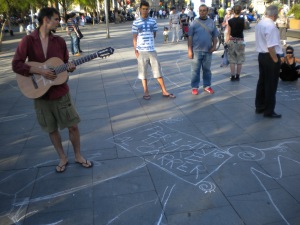+Art Collective (Barcelona, May 29, 2009)
The technological network of computers and telecommunication devices such as smart phones is central to the social nature of production characteristic of the era of cognitive capitalism. Every day massive amounts of information in the form of knowledge, science, and culture as well as currency are exchanged via the “image and language machine” that is the personal computer (“Flexible Personality”). A fascinating result of this mode of production based on language and communication, Paolo Virno argues, is the intermingling of labor, politics, and performance art. The activity that takes place between two or more immaterial laborers, between a politician and his/her electorate, and between a performing artist and his/her audience is, at once, a virtuosic performance and a political activity. According to Virno, the activity is a virtuosic performance because it “finds its own fulfillment (that is, its own purpose) in itself” and it is a political activity because it “requires the presence of others” (52). In post-Fordism, labor and politics borrow from performing artists the notion that the goal of real-time interaction is the interaction itself. No end product is produced. Similarly, labor and performing artists acquire the political attitude that, in order to work, a “publicly organized space” is needed (Hannah Arendt qtd. in Virno, 53). Virno points out:
This publicly organized space is called ‘cooperation’ by Marx. One could say: at a certain level in the development of productive social forces, labor cooperation introjects verbal communication into itself, or, more precisely, a complex of political actions. (55)
In post-Fordism, the intellect, the faculty of language and thinking, is brought out into Arendt’s “publicly organized space” for the purpose of exploiting it financially.
Works cited
Virno, Paolo. A Grammar of the Multitude: For an Analysis of Contemporary Forms of Life. Los Angeles, CA: Semiotext, 2004. Print.

